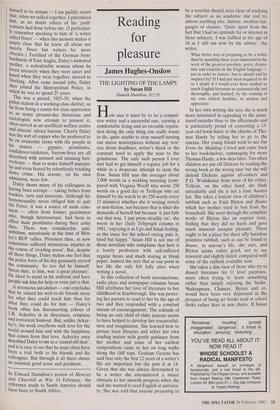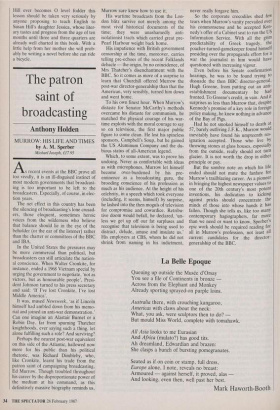Reading for pleasure
James Hughes-Onslow
THE LIGHTING OF THE LAMPS by Susan Hill
Hamish Hamilton, £12.95
How nice it must be to be a compul- sive writer and a successful one, earning a comfortable living and an enviable reputa- tion doing the only thing one really wants to do, quite unable to stop oneself turning out minor masterpieces without any wor- ries about deadlines, writer's block or the constant need to apply the nose to the grindstone. The only such person I ever met had to get himself a regular job for a while in a desperate attempt to stem the flow. Susan Hill says she averages about 3,000 words in a working morning (com- pared with Virginia Woolf who wrote 250 words on a good day or Trollope who set himself by his watch to do 250 words every 15 minutes) whether she is writing novels or non-fiction, not because that is what she demands of herself but because 'it just falls out that way. I just press steadily on', she wrote in her Daily Telegraph column in 1981, 'enjoying it as I go and finish feeling, as the essay for the school outing puts it, tired but happy.' Susan Hill is not one of those novelists who complains that hers is a lonely profession with self-inflicted regular hours and much staring at blank paper. Indeed she says that at one point in her life she only felt fully alive when writing a novel.
In this collection of book introductions, radio plays and newspaper columns Susan Hill attributes her love of literature to her childhood in Scarborough. She was pester- ing her parents to read to her by the age of two and they responded with a constant stream of encouragement. The solitude of being an only child of older parents seems to have helped to develop her resourceful- ness and imagination. She learned how to peruse local libraries and select her own reading matter with gentle guidance from her mother and some of her earliest compositions came to her on long walks along the cliff tops. Graham Greene has said that only the first 12 years of a writer's life are important but she puts it at 14. Given that she was always determined to be a writer she encountered a minor obstacle to her smooth progress when she said she wanted to read English at universi- ty. She was told that anyone proposing to be a novelist should steer clear of studying the subject as an academic one and try almost anything else, history, modern lan- guages or classics. 'Quite apart from the fact that I had no aptitude for or interest in those subjects, I was baffled at the age of 18 as I still am now by the advice', she writes.
What better way of preparing to be a writer than by spending three years immersed in the work of the greatest novelists, poets, drama- tists and essayists in the English language not in order to imitate, but to absorb and be inspired by? If I had not been required to do so I doubt if I would- ever have studied so much English literature so systematically and thoroughly, and learned, by the training of my own critical faculties, to analyse and appreciate.
In her own writing she says she is much more interested in appealing to the unini- tiated outsider than to the afficionado and is particularly proud of converting a 15- year-old book-hater to the charms of Tho- mas Hardy by telling her to go to the cinema. Her young friend went to see Far From the Madding Crowd and came back to her bookshelves, rummaging for more Thomas Hardy, a few days later. Too often children are put off Dickens by reading the wrong book at the wrong time but she will defend Dickens against all-corners and P.G. Wodehouse from most of his critics. Tolkein, on the other hand, she finds unreadable and she is not a Jane Austen fan. She takes a lenient view of children's rubbish such as Enid Blyton and Beano which her mother tried to ban from . the household. She went through the complete works of Blyton like an express train, finding that they did no harm and gave much innocent escapist pleasure. There ought to be a place for sheer silly harmless pointless rubbish, such as can be found in Beano, in anyone's life, she says, and Blyton seems rather good, not to say innocent and slightly dated, compared with some of the rubbish available now.
She takes a dim view of those who try to dissect literature for 0 level purposes, more often trying to learn something rather than simply enjoying the books. Shakespeare, Chaucer, Byron and co. would have been very depressed at the prospect of being set books read at school desks rather than in arm chairs. If Susan Hill ever becomes 0 level fodder this lesson should be taken very seriously by anyone proposing to teach English to Susan Hill's daughter Jessica, whose liter- ary tastes and progress from the age of ten months until three and three quarters are already well charted in this book. With a little help from her mother she will prob- ably be writing a novel before she can ride a bicycle.



















































 Previous page
Previous page